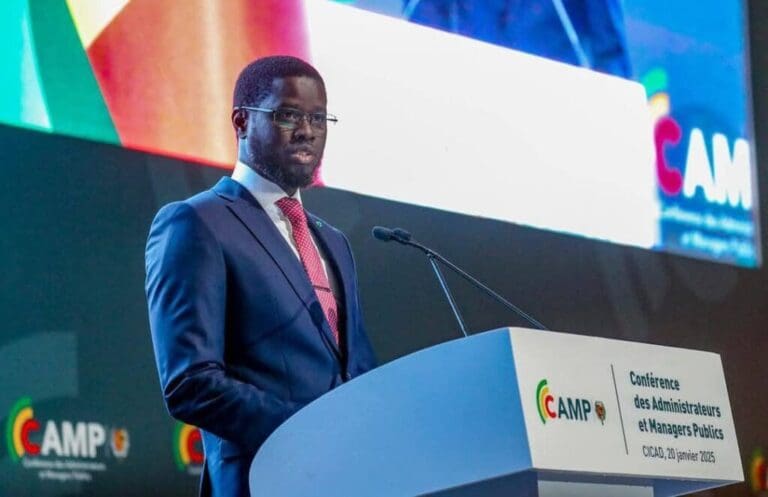President Bassirou Diomaye Faye inaugurated the first Conference of Public Administrators and Managers (CAMP) on Monday, marking the launch of a series of major reforms aimed at modernising the administration.
Amidst the cool temperatures of the new year, Faye launched the conference in Diamniadio, about 30 kilometers from Dakar. This major event brought together several government members, including Prime Minister Ousmane Sonko, as well as public administration officials.
The objective is to lay the groundwork for an ambitious modernisation of the administrative apparatus of the second largest economy in the West African Economic and Monetary Union (UEMOA) zone. This comes nine months after the arrival of new authorities who intend to implement systemic change through the public policy framework entitled “National Transformation Agenda: Senegal Vision 2050.”
In his opening speech, the 44-year-old leader outlined strategic reforms aimed at improving public finance management and strengthening administrative efficiency. He announced the imminent creation of a “national agency for the centralisation of public procurement,” an initiative he received from his Prime Minister.
“Our objective is to rationalize state spending and improve our budgetary leeway in the context of sustainable consolidation and virtuous management of our public finances,” he said, stressing the need for more rigorous and efficient management of state resources.
The Senegalese leader also emphasised inter-ministerial collaboration, calling for the finalisation of sectoral policy letters in each department and the establishment of a culture of management dialogue.
“It is together that we will succeed in building governance of sovereignty, governance of solutions, governance of results,” he said.
Collaboration and Efficiency
Harmonious and coordinated management of public policies, according to him, is essential to produce concrete results within specific deadlines. He further insisted on the generalisation of quality management in all public and para-public structures, in order to aim for the systematic certification of administrative procedures, whether simple or complex.
One of the major points of his speech concerned the acceleration of the digital transformation of public administrations.
“The time has also come to accelerate the digital transformation of our administrations,” he said, stressing the importance of the dematerialisation of formalities and their simplified accessibility, which will constitute guarantees of transparency and good governance.
In this context, the president announced the launch, on February 24, of the “Technological New Deal,” a project that aims to modernize the public service by making it more agile and forward-looking.
Faye also highlighted the internal challenges that currently hinder the effectiveness of the administration.
“After nine months in power, the findings are alarming,” he stressed, particularly concerning the state of public finances and the organisation of the administration, deemed “stuck in outdated patterns” and often ineffective in the face of rapidly evolving socio-economic realities.
The Senegalese administration faces a hypertrophied parastatal sector, often overlapping with the central administration and representing a burden on state budget, without contributing sufficiently to the nation’s dividends, Faye lamented.
He therefore pleaded for a profound reform of the administration, aimed at making it more modern, closer to the citizens and more efficient in carrying out its missions.
The president indicated that public enterprises, instead of being a “burden on the nation,” must be engines of collective prosperity and administered according to the best international standards. He recalled his promise to set up a call for applications system for certain positions of responsibility, stressing that this work has already begun at the National Human Rights Commission, headed by law professor Amsatou Sow Sidibé.
Resolutely forward-looking, the Senegalese head of state insisted on the crucial role of CAMP, which will now become “an annual themed event” and a framework for reflection and dialogue to refine the country’s governance strategies.
“Ladies and gentlemen, to lead is to decide,” he said, before calling for collective action to ensure the effective implementation of the reforms necessary for the transformation of Senegal.
ODL/ac/sf/lb/as/APA


